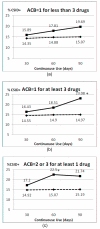Long-term anticholinergic use and the aging brain
- PMID: 23183138
- PMCID: PMC3674201
- DOI: 10.1016/j.jalz.2012.02.005
Long-term anticholinergic use and the aging brain
Abstract
Background: Older Americans are facing an epidemic of chronic diseases and are thus exposed to anticholinergics (ACs) that might negatively affect their risk of developing mild cognitive impairment (MCI) or dementia.
Objective: To investigate the association between impairment in cognitive function and previous AC exposure.
Design: A retrospective cohort study.
Setting: Primary care clinics in Indianapolis, Indiana.
Participants: A total of 3690 older adults who have undergone cognitive assessment and had a 1-year medication-dispensing record.
Outcome: Cognitive function was measured in two sequential steps: a two-step screening process followed by a formal diagnostic process for participants with positive screening results.
Exposure: Three patterns of AC exposure were defined by the duration of AC exposure, the number of AC medications dispensed at the same time, and the severity of AC effects as determined by the Anticholinergic Cognitive Burden list.
Results: Compared with older adults with no AC exposure and after adjusting for age, race, gender, and underlying comorbidity, the odds ratio for having a diagnosis of MCI was 2.73 (95% confidence interval, 1.27-5.87) among older adults who were exposed to at least three possible ACs for at least 90 days; the odds ratio for having dementia was 0.43 (95% confidence interval, 0.10-1.81).
Conclusion: Exposure to medications with severe AC cognitive burden may be a risk factor for developing MCI.
Copyright © 2013 The Alzheimer's Association. Published by Elsevier Inc. All rights reserved.
Figures
References
-
- United States Census Bureau Available at http://www.census.gov/Press-Release/www/releases/archives/population/006....
-
- Wolff JL, Starfield B, Anderson G. Prevalence, expenditures, and complications of multiple chronic conditions of the elderly. Arch Intern Med. 2002;162:2269–2276. - PubMed
-
- Schubert CC, Boustani M, Callahan CM, Perkins AJ, Carney CP, Fox C, Unverzagt F, Hui S, Hendrie HC. Comorbidity profile of dementia patients in primary care: Are they sicker? JAGS. 2006;54(1):104–109. - PubMed
-
- Boustani M, Peterson B, Hanson L, et al. Screening for dementia in primary care: a summary of the evidence for the U.S. Preventive Services Task Force. Ann Intern Med. 2003;138(11):927–937. - PubMed
-
- Boustani M, Campbell, Munger S, Maidment I, Fox C. Impact of anticholinergics on the aging brain: a review and practical application. Aging Health. 2008;4:311–320.
Publication types
MeSH terms
Substances
Grants and funding
LinkOut - more resources
Full Text Sources
Medical



 Longer than the days,…
Longer than the days,… 